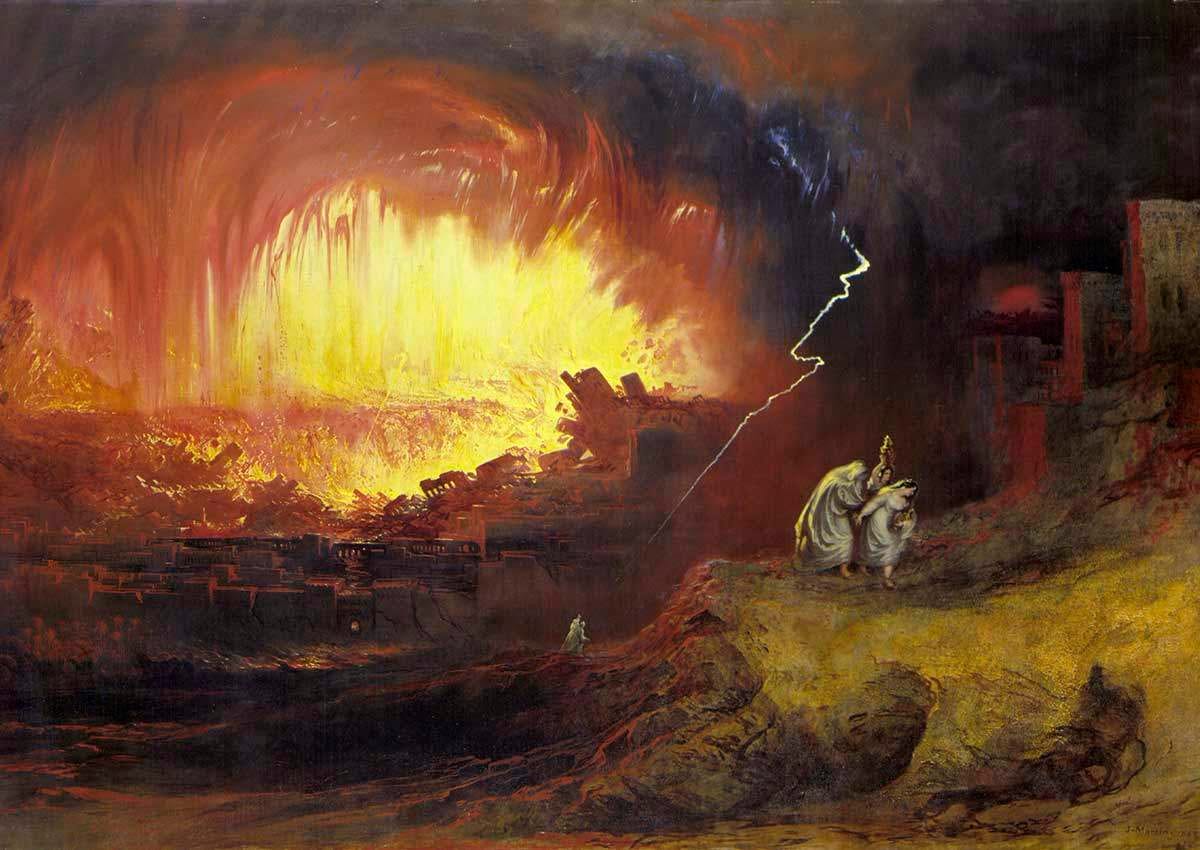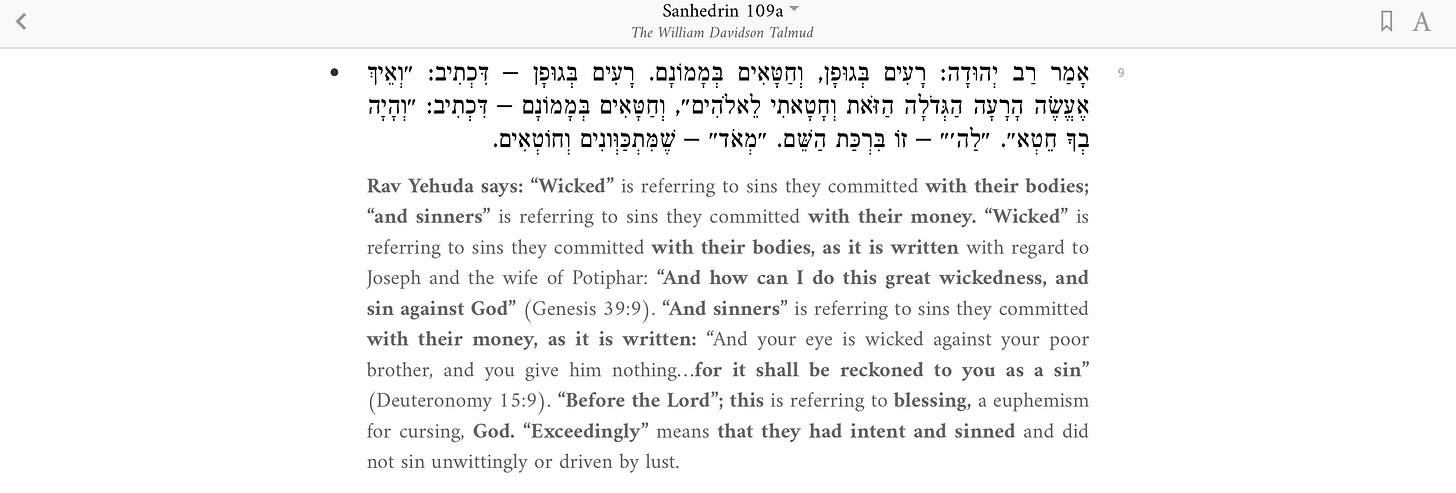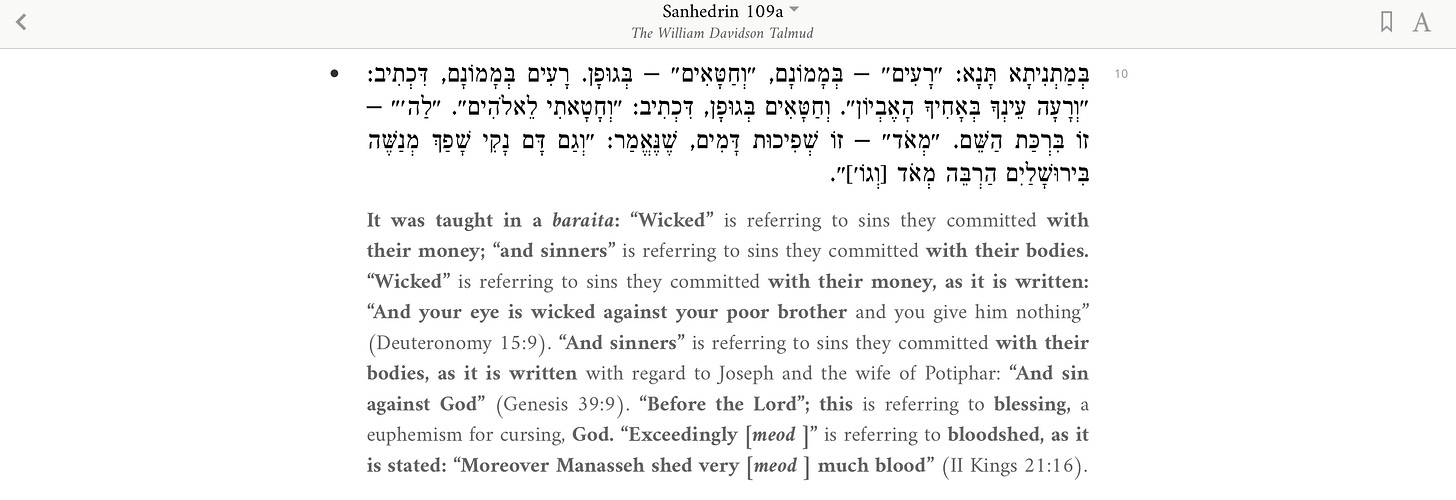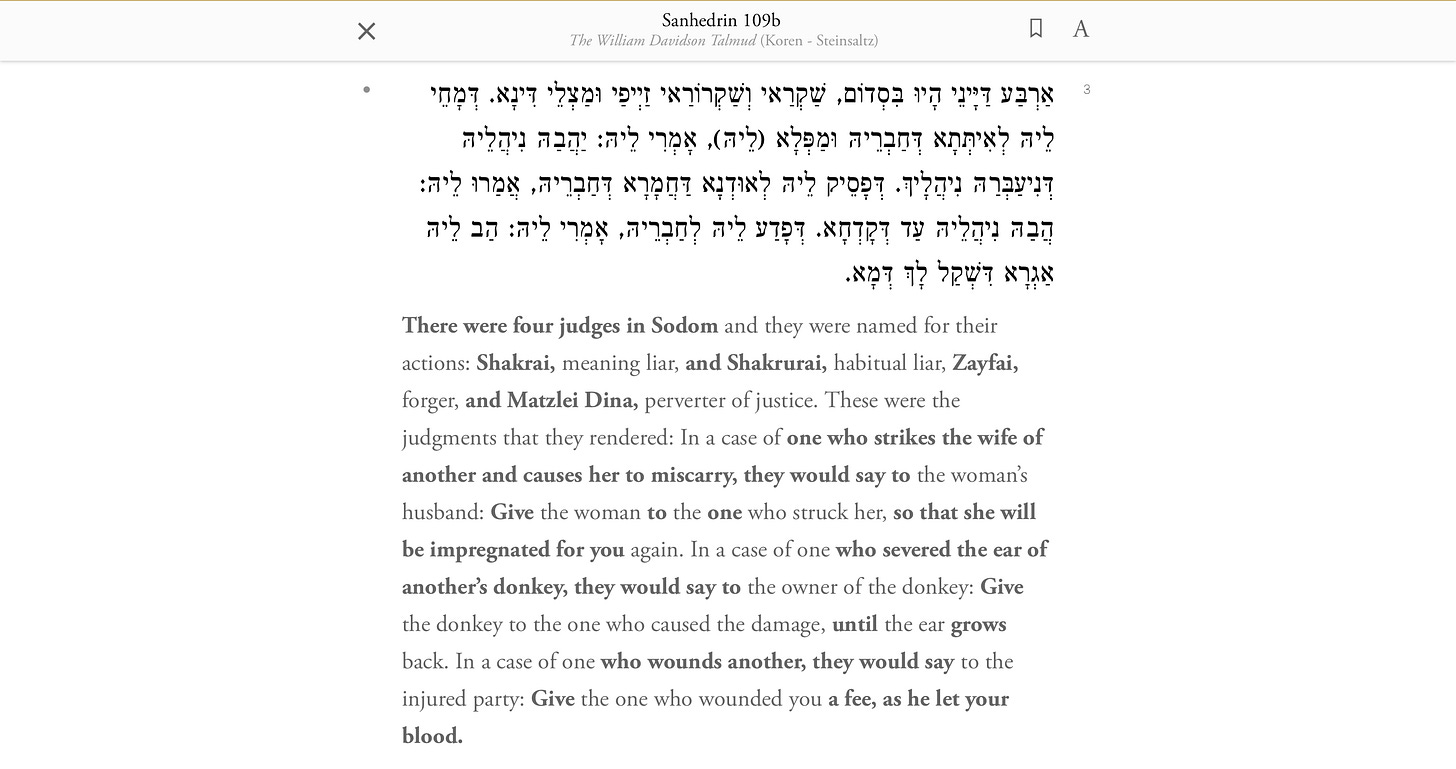What is the Sin of סְדֹם (Sdom)
hint: it’s not what you think
“Sodomy” in the Bible means homosexuality. It’s an abomination. No debate. — Oliver Burdick via Xwitter
I call bullsh1t on Oliver Burdick.
Reader, do you know the sin of Sdom? Could you describe סְדֹם based on the story in Parsha Vayeira.1
Reader, the sin of סְדֹם isn’t what you think.
I’m gonna explain the sin of סְדֹם to you because I think it’s relevant to what we see today in our society. Reader, I would argue that Canadian (for that matter also American and UK) society has become plagued by an affliction of the sin of סְדם.
First of all, let’s back it up and explain the Torah story of Sdom. Then we can move onto the exegesis and pinpoint the sin of סְדֹם.
The story of Sdom סְדֹם
The agents of g-d appear at the gate of Sdom, Lot invites them to his home and offers them hospitality. Background not in the Genesis Chapter 19 story itself: the agents have come to Sdom to execute g-d’s decision to destroy the city in its entirety; Lot is Abraham’s nephew and so g-d chose to spare him. G-d chose to destroy Sdom because the cries of the poor and disadvantaged rising to heaven have grown so loud.
A mob of city officials and militia appear at Lot’s door, demanding he hand over his visitors for the mob to know (ידע) the visitors2. Lot confronts the mob, begs them not to “take” his visitors, even offering his daughters in the place of the visitors. The mob threatens Lot and tries to break down his door and storm his house. The agents of g-d pull Lot inside the house and blocked the mob from entering and even render invisible the entrance of the house from the outside. The agents explain to Lot that g-d has marked Sdom for destruction; they instruct him to gather his family together and go far away from the place. The agents of g-d warn Lot not to look back as he flees, lest he be swept into the destruction. Lot tries to gather his family together, his sons-in-law bristle and refuse to leave. The agents urge Lot to gather his wife and daughters and together they leave, though hesitant and require physical urging from the angels. Lot’s wife disobeys the angels’ instructions by looking back and she transforms into a pillar of salt. There’s a before and after scene to this story of Sdom, and they’re ancillary to this core of the story, so I won’t go into that level of detail here.
Analysis of the Story of סְדֹם
So, reader, what have we got here? Let’s summarise the points of the story of Sdom.
G-d has decided to destroy Sdom
She sends her angelic agents to Sdom to warn Abraham’s nephew, Lot, and to help him save himself and his family from the destruction of Sdom
Lot meets the angels at the gate of Sdom, he invites them to his home and offers them hospitality
The people of Sdom form a mob and they go to Lot’s house and try to break his door down and force themselves into his home to take the visitors away to gang rape them
The angels pull Lot inside the house and seal the entrance and explain to Lot the plans for Sdom and urge him to gather his family and leave
Lot gathers his family, his sons-in-law refuse to leave, so Lot takes his daughters and his wife and readies them to leave, the angels physical urge them to leave their home when Lot and his family hesitate
Lot’s wife disobeys the instruction not to look back and becomes a pillar of salt
Reader, can you surmise the sin of Sdom from the story? Popular culture has taken the view that designates homosexuality as the sin of סְדֹם. That’s a Christian interpretation, at odds with the Judaic exegesis and tradition.
What do the Jewish sages think about this story? In the Jewish tradition of scripture study, we consult the commentary to gain a fuller understanding of the biblical texts. We can only fully understand the written Torah when we consult the oral Torah aka Mishneh and when we study the Aggadata. Let’s begin with a look at the commentary of the Rambam aka Maimonides. The wickedness of the people of סְדֹם reverberated so powerfully that it reached g-d’s ears. Meaning, reader, that the cries of the victims of Sdomites’ wickedness rose up to fill g-d’s ears.
THE CRY OF SODOM AND GOMORRAH. This is the cry of the oppressed, crying out and begging for help from the arm of their wickedness. It would have been proper for Scripture to say, “The cry of Sodom and Gomorrah I heard because it is great” or “The cry of Sodom and Gomorrah is great and their sin is very heavy.” But the purport of the verse is to state that “I will go down and see the cry of Sodom and Gomorrah and their sin which have become very great. If they have all sinned, I will bring the law to bear down on them, and if not, I will know who are the sinners.” — Rambam on Genesis 18:20 via
Next let’s look at Rabbeinu Bahya, who writes that the people of Sdom legislated against people who practiced the virtue of giving charity or being otherwise charitable. They did not even take care of their own needy who were suffering from hunger.
Bahya mentions the word רעים, which appears in Genesis 13:13, translated to English as wicked.
Again we see the theme of the cries of the suffering and poor reaching g-d — the people of Sdom behaved so wickedly that the echoes of their deeds reached g-d’s ears. Have you begun to understand what is the sin of Sdom? Reader, do you see any evidence for homosexuality being the reason g-d destroyed Sdom? The question of the sin of Sdom relates to the reason g-d has chosen to orchestrate its total destruction. Let’s now take a look at the Sanhedrin 109 tractate, mentioned above by Rabbeinu Bahya, in his description of wickedness.
Q. What did seal the fate of Sdom?
A. The people despising and opposing charity did.
In Pirkei Avot 5:10, the Mishneh says the following about human character.
There are four types of character in human beings: One that says: “mine is mine, and yours is yours”: this is a commonplace type; and some say this is a sodom-type of character. [One that says:] “mine is yours and yours is mine”: is an unlearned person (am haaretz); [One that says:] “mine is yours and yours is yours” is a pious person. [One that says:] “mine is mine, and yours is mine” is a wicked person.
Denial of and opposition to charitable deeds, wickedness of body and money, perversion of justice, and apathy in the face of the ensuing suffering of all of the above — reader, that’s the sin of Sdom.
Reader, do you have a clearer picture of the sin of סְדֹם yet? Hint: it goes well beyond men having sex with other men in a loving relationship.
Remember, Sdomite does not mean what you think. In her Sefaria source sheet on Parsha Vayera and the Sdomite, Nelly Altenburger explains the Jewish meaning of a Sdomite. As I mentioned at the beginning of this piece, Sdomite doesn’t mean what you might think based on popular Christian anglophone culture. In the Hebrew Bible Sdomite does not mean being gay. Altenburger mentions the Sanhedrin 109a tractate reference to Sdomites perpetrating wickedness with their bodies and also with their money, “wicked” is referring to sins they committed with their bodies and “sinners” is referring to sins they committed with their money. Sinning with money refers to the arrogance and greed of denying charity to those in need, and it could also include corruption, an offense closely tied with greed and arrogance and failing to serve and care for the poor and destitute.
Our popular Christian-dominant culture has conditioned us to think of sinning with bodies in a specific sexual (ie homophobic) context. That’s a narrow and misguided interpretation. The Sages mention Joseph and Potiphar’s wife, that’s a reference to adulterous behaviour. You can read that story in Genesis 39, around line 7 — briefly, Potiphar’s3 wife tried to seduce Joseph into lying with her and when Joseph refused she accused him of rape and had him imprisoned. The Sages don’t single out homosexuality as an example of sinning with the body and they single out sleeping with a married woman as an example of sinning with the body. The Sages do mention robbery. They also mention physical attacks. Sinning against the body obviously includes gang rape, as mentioned in the story of Sdom itself, Genesis 19:5.
So, we’ve discussed the sin of Sdom, committed with bodies and with money. But wait, there’s more. The sin of Sdom has its roots in the perverse ethics of the society as a whole — evil judges—liar, habitual liar, forger, perverter of justice—and their perversions of judgement. It’s important for readers to come away from this discussion with an understanding of the sin of סְדם as a collective offense against g-d—it’s wickedness of the entire society and not individuals. When you invoke the story of Sdom to persecute gay men, you’re abusing the biblical text to justify homophobia. It’s unbecoming and it’s unmerciful. It’s also wrong.
Reader, do you see themes of סְדֹם in the world around you? Do you see the wickedness of Sdom in Canadian (or American or UK) society? My Canadian and US readers can likely see themes of lying, misrepresentation, and perverted justice in their governments. Canadian readers can likely see these sins of perverse judgement in their criminal justice system.
Reader, I think Canada has devolved into Sdom.
We put rapists in female prison, effectively institutionalising state-mandated rape of carceral women. We force parents to submit their children to the GenderWang Janissaries, threatening them with removal of their children should they oppose the state-mandated sex change, which the state calls gender affirmation. We have statutory release of violent criminals. We have state mandated drug addiction and homelessness, which the state calls harm reduction and community-based social justice. We have normalised violent psychosis, having dismantled institutional psychiatric care and weakened the mental health care system to the point of inefficacy and collapse. We deny women’s rights. We institutionalise racism and apartheid, which the state calls antiracism and DEI. We incentivise Jew hatred and also hatred of Christians, which the state calls decolonisation. We call it “Islamophobia” when anyone criticises radical Islam and terrorism.
Canada is wicked. Canada = סְדֹם.
Biblical reference for Parsha Vayeira is Genesis Chapter 18 thru to 22, and the story of Sdom spans Chapter 18 + 19.
In Biblical Hebrew the word עדי refers to sexual contact.
Potiphar is an Egyptian courtier, he purchased Joseph as a slave.














